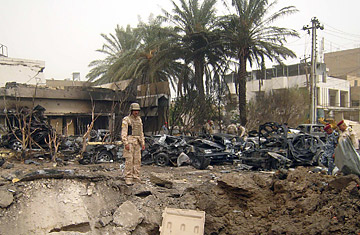
An Iraqi soldier stands on the edge of a crater following a car bomb in the residential district of Mansur in the west of the capital Baghdad on September 19, 2010, one of two near-simultaneous car bombs that rocked the city killing some over 25 people and wounding over 100 others.
Mindful that the likely return to power of Prime Minister Nouri al-Maliki at the head of yet another Shi'ite-dominated government could potentially trigger a Sunni backlash, the Iraqi military is putting on a show of force in Anbar province — an erstwhile hotbed of insurgency. But that plan risks inflaming hostility in a community that already feels politically marginalized.
Friday's pact with radical cleric Moqtada al-Sadr greatly strengthens Prime Minister Nouri al-Maliki's chances of securing a second term, but the deal between the Shi'ite heavyweights could once again leave the Sunnis out in the cold. Some fear that could prompt Sunnis to reactivate the dormant insurgency, undoing three years' worth of American efforts to bring the Sunnis into the political process, and bringing Iraq back to the brink of civil war even as U.S. forces prepare to leave the country by the end of next year.
Sunni Arabs make up around 20% of Iraq's population, but they ruled the country for 1,400 years until the fall of Saddam Hussein in 2003, when the Shi'ites — who account for 60% — finally took the reins in Baghdad. The Sunnis reacted by forming militant groups that, sometimes in alliance with al-Qaeda, targeted both the U.S. military and Shi'ites. By 2006, the two Iraqi communities were engaged in a sectarian war that claimed tens of thousands of lives.
The U.S. troop surge, accompanied by U.S. diplomatic efforts to integrate the Sunnis in the new power structure, largely quieted the insurgency. Whereas most Sunnis had boycotted the 2005 election, they turned out in large numbers in the general election last March, with most giving their votes to the secular Iraqiyya list of former Prime Minister Iyad Allawi. Iraqiya won the largest number of seats, but nowhere near a majority. Now the Maliki-Sadr deal which puts the Shi'ite parties within reach of a majority looks to have outmaneuvered Allawi, leaving the Sunnis where they were before the vote: out of power.
Sunni leaders have responded angrily to what they see as the ganging-up of the Shi'ites, but nobody has as yet called for a return to arms. With the U.S. presence now greatly reduced, ensuring the Sunnis stay quiescent falls mainly to the Iraqi military.
Eyewitnesses in several Anbar cities report an increased military presence in the streets, in the form of Army patrols and checkpoints. Here in Fallujah, patrols have been increased dramatically since Friday's announcement. "The message is: 'We are here, watching you, so don't get any ideas'," says Mohammed al-Shabib, sheikh of the powerful Issawi tribe in Fallujah.
Anbaris say the exertion of military muscle is unnecessary: they may be mad, but not enough to bring out their guns. "People are just tired of fighting," says another influential sheikh, Abdel Jabbar al-Feydawi. "We're all trying to move on, to find jobs and businesses."
But the military show of force risks antagonizing an already sullen populace: the Army is highly unpopular in Fallujah, mainly because most of the soldiers come from other provinces. Anbaris — and especially Fallujis — are famously suspicious of outsiders. They much prefer the local police force, comprised mainly of local recruits. (This is the reverse of the norm for most of Iraq, where the military enjoys more credibility than the police.) "We don't like outsiders stopping us in the street and treating us like criminals," says Shabib.
Like Faydawi, Shabib says his tribe is not in a fighting mood. But he warns that could change if the military overplays its hand. "I worry that tempers are raised, and something happens — a soldier starts shooting, civilians are killed. Something like that could set off the insurgency."
